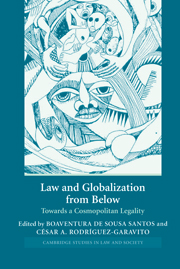Book contents
- Frontmatter
- Contents
- Notes on the contributors
- 1 Law, politics, and the subaltern in counter-hegemonic globalization
- PART ONE LAW AND THE CONSTRUCTION OF A GLOBAL ECONOMY OF SOLIDARITY
- PART TWO TRANSNATIONAL SOCIAL MOVEMENTS AND THE RECONSTRUCTION OF HUMAN RIGHTS
- 8 Limits of law in counter-hegemonic globalization: the Indian Supreme Court and the Narmada Valley struggle
- 9 The Movement of the Landless (MST), juridical field, and legal change in Brazil
- 10 Indigenous rights, transnational activism, and legal mobilization: the struggle of the U'wa people in Colombia
- 11 Defensive and oppositional counter-hegemonic uses of international law: from the International Criminal Court to the common heritage of humankind
- PART THREE LAW AND PARTICIPATORY DEMOCRACY: BETWEEN THE LOCAL AND THE GLOBAL
- Index
- References
9 - The Movement of the Landless (MST), juridical field, and legal change in Brazil
Published online by Cambridge University Press: 07 July 2009
- Frontmatter
- Contents
- Notes on the contributors
- 1 Law, politics, and the subaltern in counter-hegemonic globalization
- PART ONE LAW AND THE CONSTRUCTION OF A GLOBAL ECONOMY OF SOLIDARITY
- PART TWO TRANSNATIONAL SOCIAL MOVEMENTS AND THE RECONSTRUCTION OF HUMAN RIGHTS
- 8 Limits of law in counter-hegemonic globalization: the Indian Supreme Court and the Narmada Valley struggle
- 9 The Movement of the Landless (MST), juridical field, and legal change in Brazil
- 10 Indigenous rights, transnational activism, and legal mobilization: the struggle of the U'wa people in Colombia
- 11 Defensive and oppositional counter-hegemonic uses of international law: from the International Criminal Court to the common heritage of humankind
- PART THREE LAW AND PARTICIPATORY DEMOCRACY: BETWEEN THE LOCAL AND THE GLOBAL
- Index
- References
Summary
INTRODUCTION
What forms of legal change can social movements set in motion to diminish systemic and durable forms of social exclusion? And when are movements successful at doing so? This chapter explores these two questions in the context of the struggle for land waged by the Movement of the Landless' (MST) in Brazil, a country which has one of the most unequal land distributions in the world. It focuses in particular on the movement's emergent juridical strategy and that strategy's contribution to legal change. The MST rarely initiates legal action itself, and in fact does not have standing to bring cases to expropriate land for agrarian reform, which is the preserve of federal government. In recent years, however, its reactive juridical strategy – in civil and criminal cases brought against it – has grown increasingly sophisticated. The movement has helped produce watershed legal precedents, contributed to a broader process of constitutionalizing law, and made access to land more equitable in parts of Brazil by redefining property rights in practice.
These outcomes have been achieved at a world historic moment when powerful international institutions are committed to globalizing a new “classic” interpretation of liberal property rights. The creation of rural and urban land markets, modeled on a mythologized account of Western property regimes, has become a pillar of many international programs of structural reform and to combat poverty.
- Type
- Chapter
- Information
- Law and Globalization from BelowTowards a Cosmopolitan Legality, pp. 218 - 240Publisher: Cambridge University PressPrint publication year: 2005
References
- 25
- Cited by



